39 other carbs on food labels
Food Labels: Carbohydrates | Home & Garden Information Center On the other hand, choose foods often that contain 5% DV or less of nutrients that you want to limit (e.g., total fat, saturated, fat, trans fat, cholesterol and sodium). Example: On this label the total amount of carbohydrates in one serving (1 packet) is 24 g, or 8% DV. The dietary fiber is 1 g, or 3% DV. The total amount of sugars is 19 g. Added Sugars on the New Nutrition Facts Label | FDA Let the Nutrition Facts Label Be Your Guide The new Nutrition Facts label can help you compare and choose foods that are lower in added sugars. Check the label to see if foods are LOW or HIGH in...
Reading food labels: Tips if you have diabetes - Mayo Clinic The serving sizes listed on food labels may be different from the serving sizes in your meal plan. If you eat twice the serving size listed on the label, you also double the calories, fat, carbohydrates, protein, sodium and other ingredients. Consider your daily calorie goals. The same goes for the Daily Value listed on food labels.

Other carbs on food labels
How to Read a Food Label | Atkins The FDA requires that a nutrition label include the total carbohydrates. The amount of dietary fiber and sugars must also be listed. However, the law does not require that other carbohydrate subcategories appear. Some manufacturers voluntarily include the subcategories of sugar alcohol and "other carbohydrates." Others do not. Food Labels: Fat & Cholesterol | Home & Garden Information Center For all nutrients that you want to limit (e.g., total fat, saturated fat, trans fat, cholesterol and sodium), choose foods often that contain 5% DV or less of these nutrients. On the other hand, select foods with 20% DV or more of nutrients that you want to consume in larger amounts (e.g., fiber and calcium). What Do Total Carbohydrate And Added Sugar On The Nutrition Label Mean ... If more than one type of sugar alcohol is listed, there must be a line for sugar alcohol grams on the nutrition label. Other Carbohydrates shows the number of digestible complex carbohydrates not considered a sugar (natural or added) and includes additives like stabilizers and starchy thickening agents. Now, isn't that crystal clear? Save
Other carbs on food labels. Reading Food Labels When You Have Diabetes - WebMD At least 25% less cholesterol and 2 g or less of saturated fat. Calorie free. Less than 5 calories. Low calorie. 40 calories or less. Light or lite. 1/3 fewer calories or 50% less fat. Other ... What Is the Difference Between Sugar & Carbs on Food Labels? Each gram of carbohydrate and protein provides 4 calories, while a gram of fat provides 9 calories. Carbohydrates are found in a wide variety of foods, such as grain products, including bread, pasta, breakfast cereals, oatmeal, flours, crackers, starchy vegetables like potatoes and corn, legumes, milk, yogurt, fruits, juices, sugar and desserts. dtc.ucsf.edu › learning-to-read-labelsLearning To Read Labels :: Diabetes Education Online On a nutrition food label, subtract the fiber from the total carbohydrate amount. When you read food labels, the grams of sugar are already included in the total carbohydrate amount, so you do not need to count this sugar amount separately. The grams of sugar listed include both natural sugars, from fruit or milk, and added sugars. Food Label Claims: What You Can and Can't Trust - WebMD Gluten-Free. This label is important for people with gluten sensitivity or celiac disease, an autoimmune condition. There is no FDA symbol for this standard. But you can trust a gluten-free claim ...
Low Carb Guide to Understanding Nutrition Labels - Virta Health The carbohydrate count is given as total grams, and then broken down into carbs from fiber and sugar. Focus on total carbohydrate. Sugar should be zero as often as possible (1-2g at most). Fiber is a carb and should be included in your total for the day (initially 30g or less). Again, pay attention to the serving size. Although food labels have some important advantages, there are also some problems related to them. For instance, food labels might mislead people and may influence their decisions in a rather suboptimal manner. Many producers claim that their products are “low-fat”, “low-carb” or other declarations that seem to be positive at first glance. How to Understand and Use the Nutrition Facts Label | FDA It's important to realize that all the nutrient amounts shown on the label, including the number of calories, refer to the size of the serving. Pay attention to the serving size, especially how ... Optional Nutrients On The Food Label - LabelCalc Dietary fiber. Sugars. Protein. Vitamin A. Vitamin C. Calcium. Iron. These nutrients are mandatory because the FDA considers them the most essential to either limit our intake of (in the case of cholesterol, sodium, and trans fat) or increase our intake of them (in the case of iron, Vitamin C, and dietary fiber).
What Is the Difference Between Sugar & Carbs on Food Labels? Carbohydrates. Carbohydrates are your body's preferred source of energy and should account for 45 to 65 percent of your daily calories. With 4 calories in 1 gram of carbohydrates, this amounts to 225 to 325 grams of total carbohydrates on a 2,000-calorie-per-day diet. The Code of Federal Regulations for food and drugs requires that food labels ... How to Read Nutrition Facts Label - Food Network This carries over to all the other nutrients on the label. If 1 serving of a food has 120 mg of sodium, it can technically be labeled as a "low sodium" food. How To Figure Out The Carbs On Nutrition Labels If more than one type of sugar alcohol is listed, there must be a line for sugar alcohol grams on the nutrition label. Other Carbohydrates shows the number of digestible complex carbohydrates not considered a sugar (natural or added) and includes additives like stabilizers and starchy thickening agents. They don't make it easy, do they? Save What Do Total Carbohydrate And Added Sugar On The Nutrition Label Mean ... If more than one type of sugar alcohol is listed, there must be a line for sugar alcohol grams on the nutrition label. Other Carbohydrates shows the number of digestible complex carbohydrates not considered a sugar (natural or added) and includes additives like stabilizers and starchy thickening agents. Now, isn't that crystal clear? Save
Food Labels: Fat & Cholesterol | Home & Garden Information Center For all nutrients that you want to limit (e.g., total fat, saturated fat, trans fat, cholesterol and sodium), choose foods often that contain 5% DV or less of these nutrients. On the other hand, select foods with 20% DV or more of nutrients that you want to consume in larger amounts (e.g., fiber and calcium).
How to Read a Food Label | Atkins The FDA requires that a nutrition label include the total carbohydrates. The amount of dietary fiber and sugars must also be listed. However, the law does not require that other carbohydrate subcategories appear. Some manufacturers voluntarily include the subcategories of sugar alcohol and "other carbohydrates." Others do not.
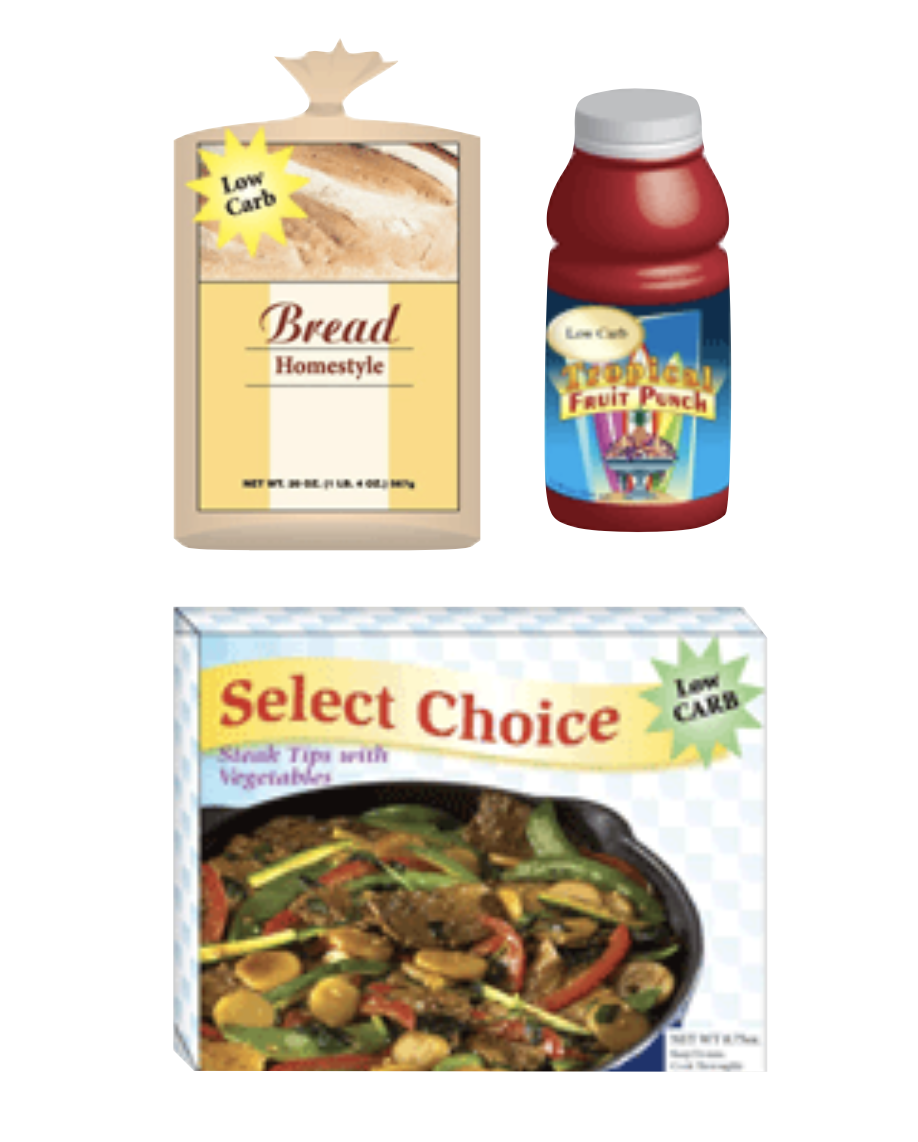
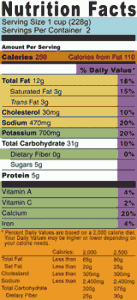
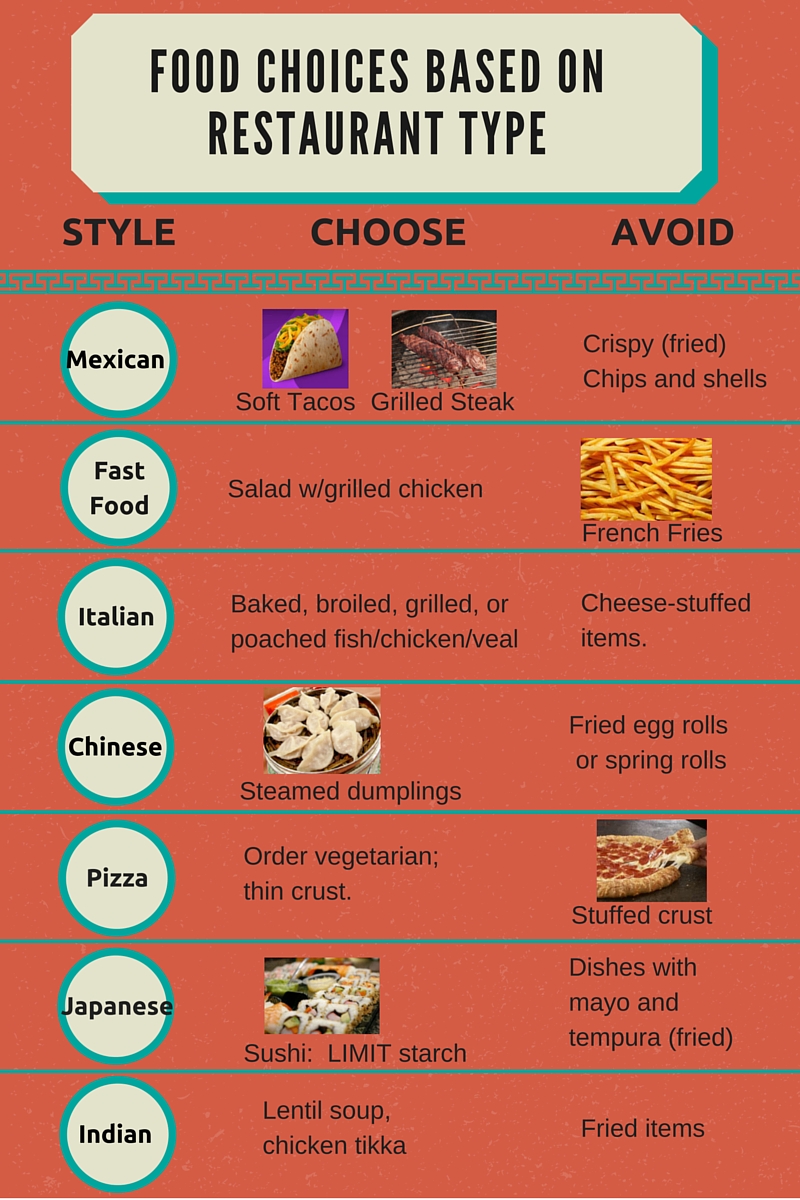



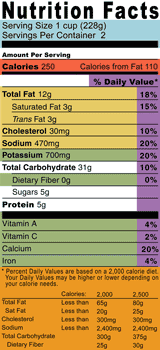


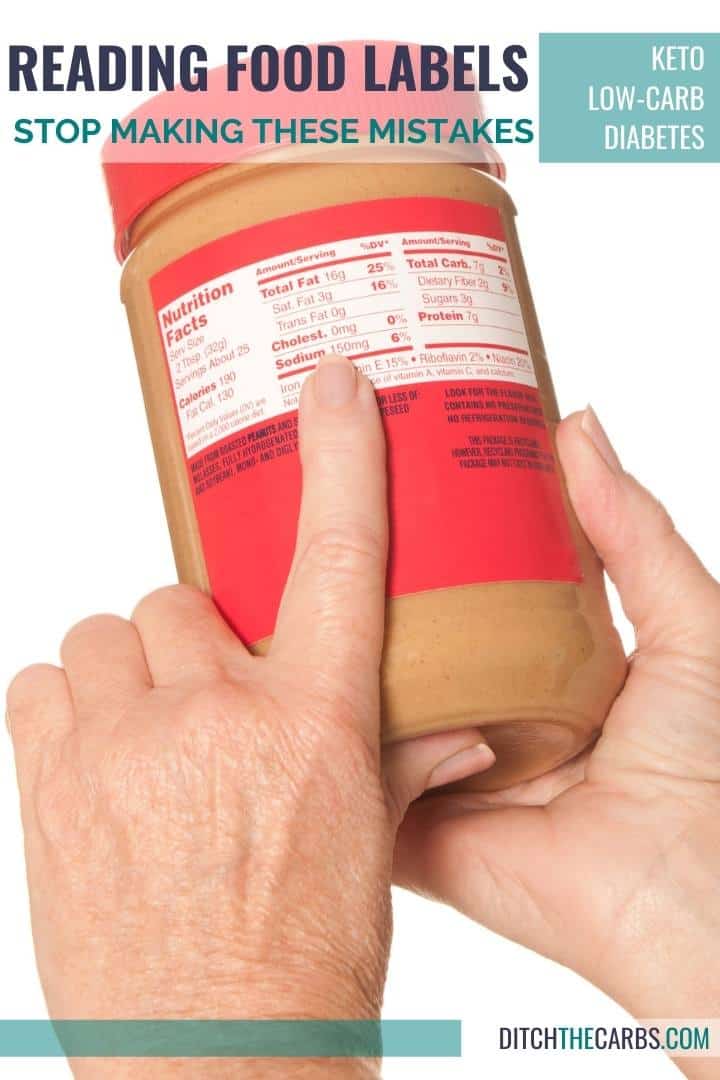




Post a Comment for "39 other carbs on food labels"